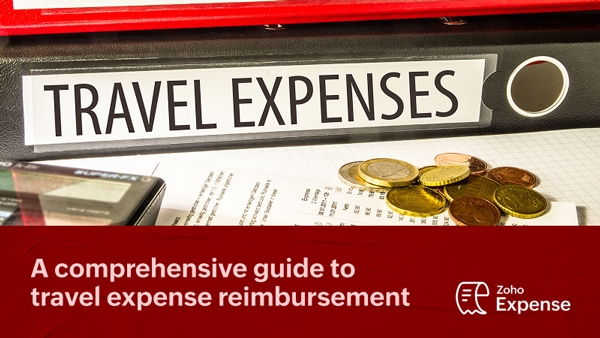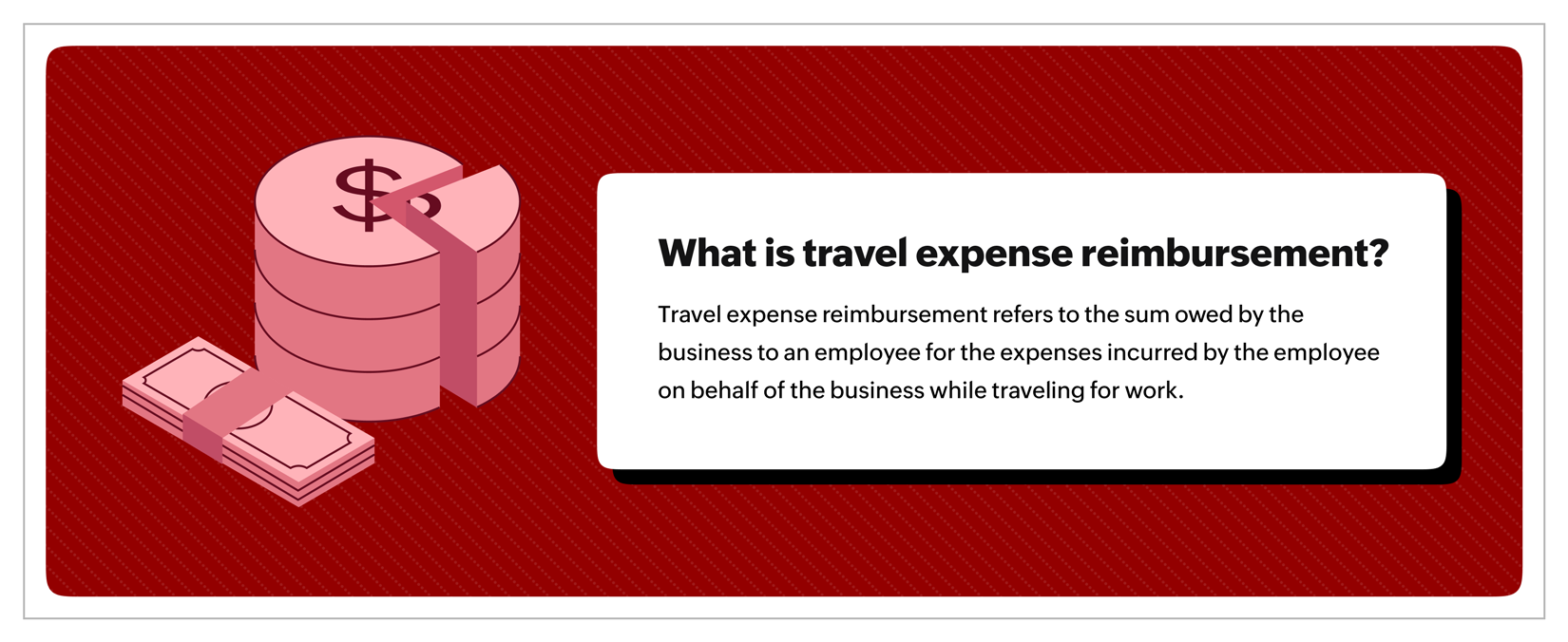- HOME
- Business travel
- A comprehensive guide for businesses to master travel expense reimbursement in 2025
A comprehensive guide for businesses to master travel expense reimbursement in 2025
Introduction
Globalization has deemed business travel for almost all businesses an absolute necessity. Even smaller local businesses are leveling up by trading with vendors across borders. Souvenir shops are now sourcing reasonable products from Chinese vendors, and boutique restaurants are now serving gourmet cheeses available only in France. This not only proves the need and importance of business travel in current times, but it also helps understand why business travel expenses take up a substantial portion of expense accounting for even small business owners.
For growing businesses, reimbursing these travel expenses is an added effort from administrators, which requires a deeper understanding of the subject at hand. This guide takes you through every aspect of understanding and managing business travel expenses. Whether you're learning expense accounting, managing a small business where employees travel for work, maximizing your IRS travel tax deductions, or looking for a more efficient way to manage business travel expenses, this guide is for you.

What is travel expense reimbursement?
Travel expense reimbursement refers to the sum owed by the business to an employee for expenses incurred on behalf of the business while traveling for work.
Employees traveling for work often spend on flights, accommodation, meals, cabs, tips, gifts, and more, which is then reimbursed by the business. Most businesses have a travel policy that controls the spend limits and sets the workflows to help formalize and process these reimbursements.
For example, a customer relationship manager is traveling to meet a disgruntled customer and solve their issues. While the company books their flights and accommodation, the manager must spend from their pocket for the impromptu customer lunch to celebrate the successful visit. They follow the business policy of a $100 spend limit for a customer lunch and claim reimbursement by submitting the actual bill after the customer visit. This expense reimbursement qualifies as a travel expense reimbursement.

What are IRS guidelines and compliance requirements regarding business travel expenses?
The Internal Revenue Service (IRS) is the governing authority for taxation laws in the US. It publishes the guidelines and rules for filing taxes for both businesses and individuals. It periodically revises and publishes these details for business travel expenses as well. Let's dive into the complex rules and deductions that the IRS allows for businesses.
Before you get to maximizing the tax savings, here's a quick look at the official terms that the IRS uses.
Tax home: Do not be misled by the word "home" in this term as it refers to the regular place of business, regardless of where you live.
Business travel expense: The IRS does not specifically define business travel expense, although it falls under the umbrella term "business expense," which the IRS defines as an ordinary and necessary expense incurred by the business that is common, accepted, helpful, and appropriate for your trade or business.
Here are some of the business travel expense categories that fall under this definition.
- Transportation: Airfare, train, bus, cab, or car expenses incurred during business travel.
- Lodging: Accommodation expenses such as hotels, guest houses, motels, or more will fall under this expense category.
- Meals: Breakfast, lunch, dinner, or other food purchases incurred during the trip will be considered as a business travel expense.
- Other expenses: Expenses such as porter charges, laundry, baggage charges, Wi-Fi charges, phone calls, and more that are incurred as a necessary expense during the trip will also be counted as IRS deductible business travel expenses.
How to craft an effective travel and expense policy
Based on the company's travel booking patterns, traveler requirements, business goals, and budgets, a custom travel and expense policy that addresses questions, workflows, limits, and restrictions helps streamline the travel management process from booking to reimbursement.
Click here for a quick overview on how to craft an ideal travel and expense policy for your business that discusses the importance and key components of a policy along with with a free downloadable and customizable template.
How to automate travel expense management
Travel expenses in today's businesses are substantial and are streamlined to gain maximum ROI. Small businesses often start managing their business travel through ad hoc travel booking expenses later reimbursed through email approvals, making it impossible for businesses to track and manage. These organizations grow to build streamlined processes to ensure smoother workflows, faster reimbursements, budgeted expenses, and maximum ROI. A number of tools on the market help automate the process while ensuring visibility and control, such as Zoho Expense.
Let's take a look at some of the highlighting features of Zoho Expense that can help you automate your travel expense management process.
- Policies: Set up travel policies with restrictions across merchants, expense category limits, custom limits, exceptional limits, and more with Zoho Expense's robust policy engine.
- Automated per diem: Import and automate GSA per diem rates right from within Zoho Expense.
- Custom rules: Customize approval rules, expense limits, and more as per custom criteria built based on your business policies.
- Automated approval workflows: Set up hierarchical approval workflows, custom workflows, or even ad hoc approvals with Zoho Expense.
- Continuous audit: Set up continuous audits against duplicate invoices, manual expensing, receipt-less expenses, and more. Policy violations are highlighted before reports are approved to ensure absolute compliance.
- Receipt capture: Multiple ways to automatically capture and convert a receipt to an expense—from AI-powered Autoscan for on-the-go receipt capture to automated email forwarding for all the digital receipts that business travelers receive in their emails.
- Credit card expense management: With Real-Time Feeds, every card swipe converts to an expense on the spot, making managing travel expenses via your corporate cards easy and fast.
- Reimbursements: Expedited expense approvals mean faster reimbursements—a win-win for employers and employees.
Best practices for employees and employers
Here are a few best practices for employers to effectively manage business travel expenses:
- Create and maintain a clear travel and expense policy. This helps employees set the right expectations and improves compliance.
- Define and communicate pre-trip approvals to prevent unnecessary travel, update the stakeholders about upcoming travel and its agenda, and control travel expenses based on budget utilization.
- Centralize travel bookings to control cost and improve spend visibility.
- Opt for corporate cards issued by financial institutions recognized by your regulatory authorities to gain maximum benefits and ensure compliance.
- Automate approval workflows with software solutions like Zoho Expense that integrate with your accounting and HR applications to ensure data clarity.
- Configure frequent and regular reports and build dashboards for in-depth visibility and control, reduce waste, and negotiate better with historical accurate data.
While employers have the control and flexibility to build travel and expense policies, employees must also follow certain best practices for faster reimbursements and smoother processes.
- Know your company's travel and expense policy.
- Follow set approval workflows for pre-trip approvals and smoother trip expense processing.
- Book travel through company approved channels and vendors to avoid issues during reimbursement.
- Avoid last minute booking for better prices, options, and flexibility.
- Ensure frugality when making expense decisions. Look for accommodation, flight, and meal options that fit your requirements, ensure comfort, and have the highest savings.
- Get carbon emissions for flights and routes to choose eco-friendly options and help your business achieve carbon reduction goals.
- Leverage the company's expense management software to digitize and store receipts for regulatory requirements.
Common challenges and solutions
Below are some of the common challenges businesses face when managing travel expenses and how to solve them.
- Travel expense reporting: Employees often misplace receipts or damage the same as they travel through grueling itineraries and focus on the task at hand. This makes expense report creation and submission a major challenge. Additionally, finance teams often find it difficult to follow up with multiple employees for claim request submissions and lose time collecting, verifying, auditing, and processing the reports.
- Delayed books closure: Accounting teams across industries often find it highly challenging to close their accounting books as pending advances, reimbursement claims, and missing receipts cause unnecessary delays.
- Missing and damaged receipts: In many cases, employees often forget, misplace, or damage their receipts, losing out on a lot of their hard earned money.
- Lack of visibility: Businesses often lack real-time visibility on expenses incurred as traveling employees tend to submit their expense reports only after their return. This causes delays and affects budgetary decisions made with incomplete information.
The easiest solution is automating and digitizing the entire travel expense management process through software that can help businesses overcome all the aforementioned challenges while freeing up time and resources for more strategic initiatives.
Future trends in travel expense management
AI leveraged receipt capture: Not just capturing the data of the receipt, AI technology holds the potential to verify the receipt against the vendor's geolocation and match it against the employee's location for a quick audit. AI can also check the rates of the items with published data and flag discrepancies, if any.
AI-generated receipt flagging: While this technology is currently in use, it has its limitations. A future trend in this technology suggests a full-proof identification and flagging system for fake or AI-generated receipts to overcome fraudulent expense claims.
Predictive spend pattern recognition: AI's capability to comprehend data and identify patterns allows it to build near-accurate forecasting models for budgeting and spend management purposes.
Augmented reality employee experience: Augmented reality in the airline space and its commercialization will soon allow employees to experience their travel booking options virtually before they book. From checking flight seats, hotel rooms, and navigation to and from the bookings to the destination, AR can help immensely elevate the employee experience for business travelers.
Conclusion
Businesses today are trying to let go of their manual processes and adopt automation while AI technologies create both trouble and solutions for them. The key to mastering travel expense reimbursement in 2025 lies in following the current best practices while planning for a paradigm shift in how AI technology helps manage the same.
Finance executives today focus on policy compliance, expense reporting, receipt management, corporate card management, faster reimbursements, automated approvals, and streamlined processes. They must learn to leverage real-time expense tracking, on-the-go employee expense submissions, automated policy compliance, categorization, and more to stay ahead of the curve.
Those who understand and prepare for this transformation today will be the expense management leaders of tomorrow.
- Dhwani
Dhwani Parekh is a seasoned FinTech content writer with more than 7 years of experience in SaaS marketing. As a contributing expert at Academy by Zoho Expense, she focuses on uncovering trends that empower businesses to streamline their financial operations, especially business travel and expense management. With deep industry knowledge and a pulse on the rapidly evolving landscape of business spend, Dhwani’s content adds tremendous value to Academy by Zoho Expense.
